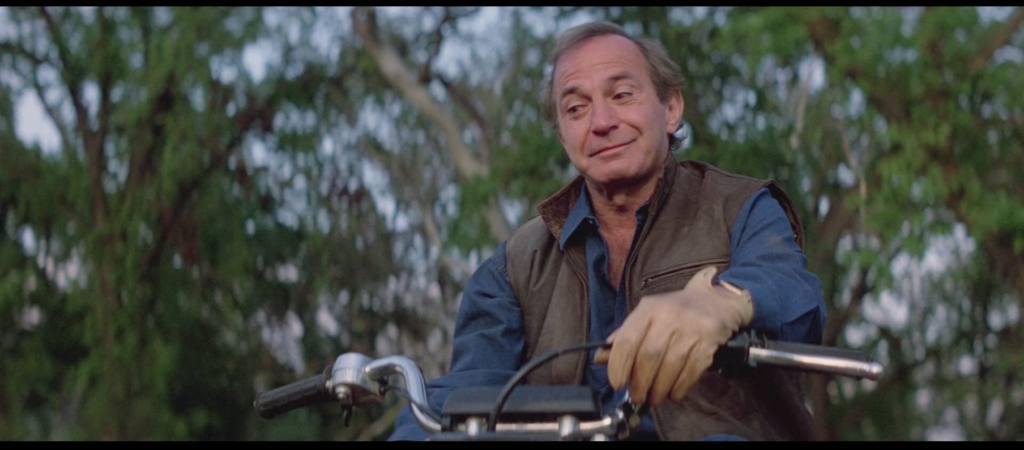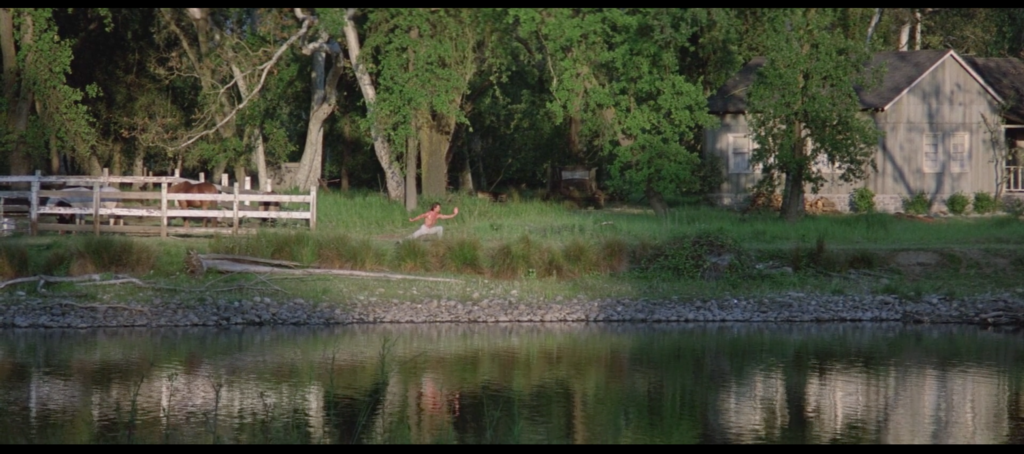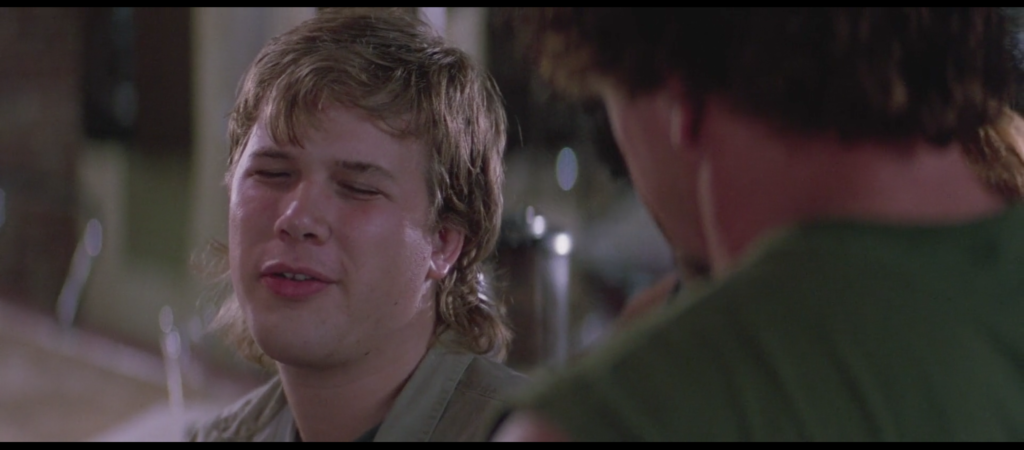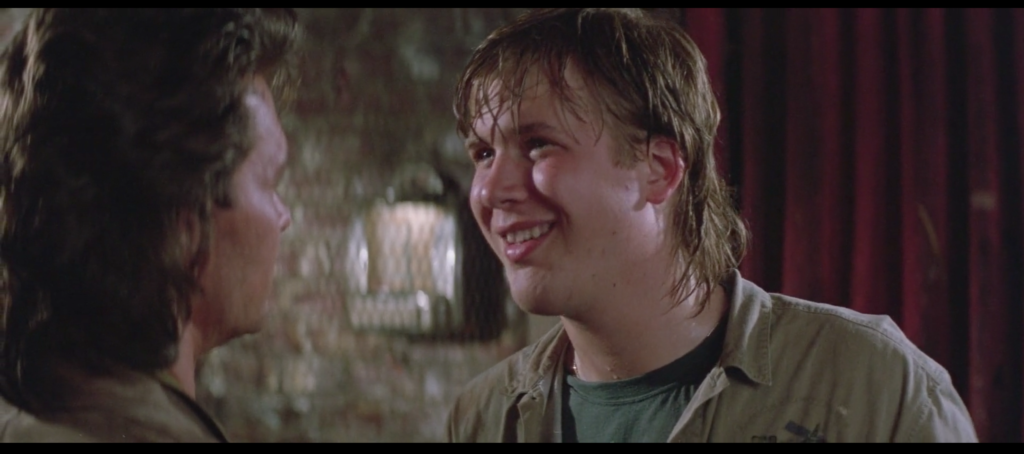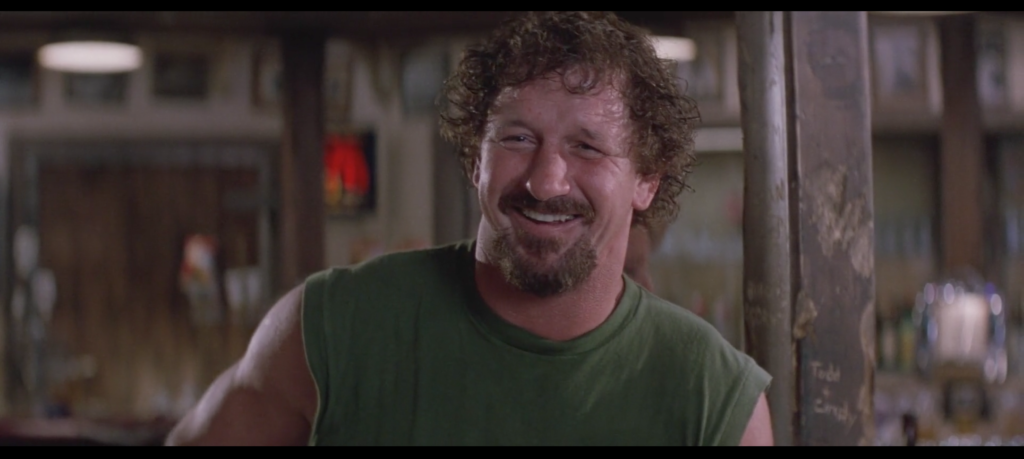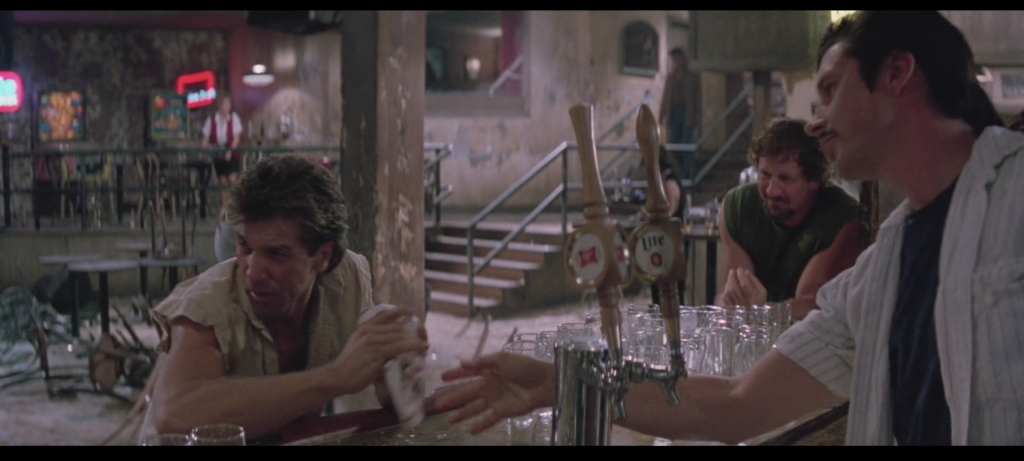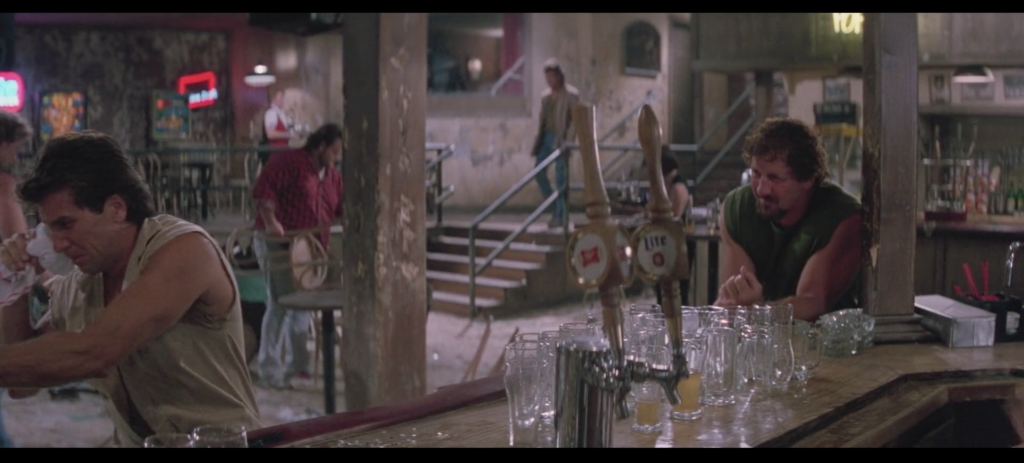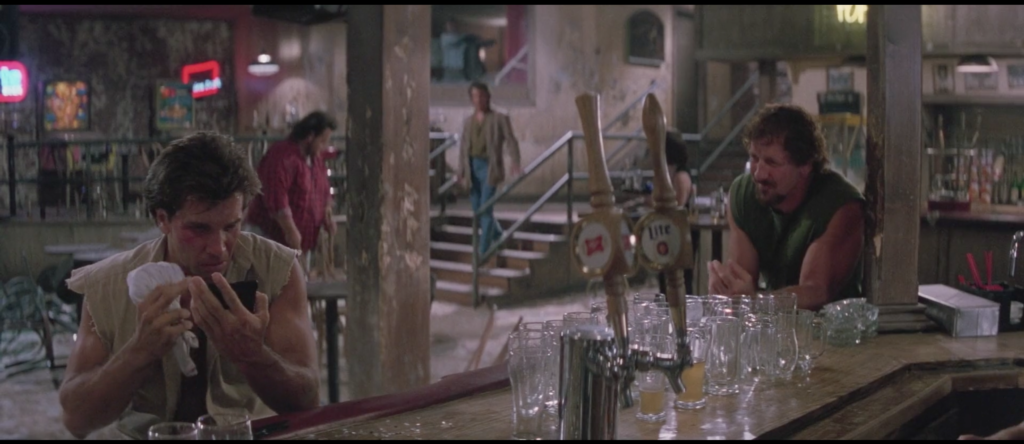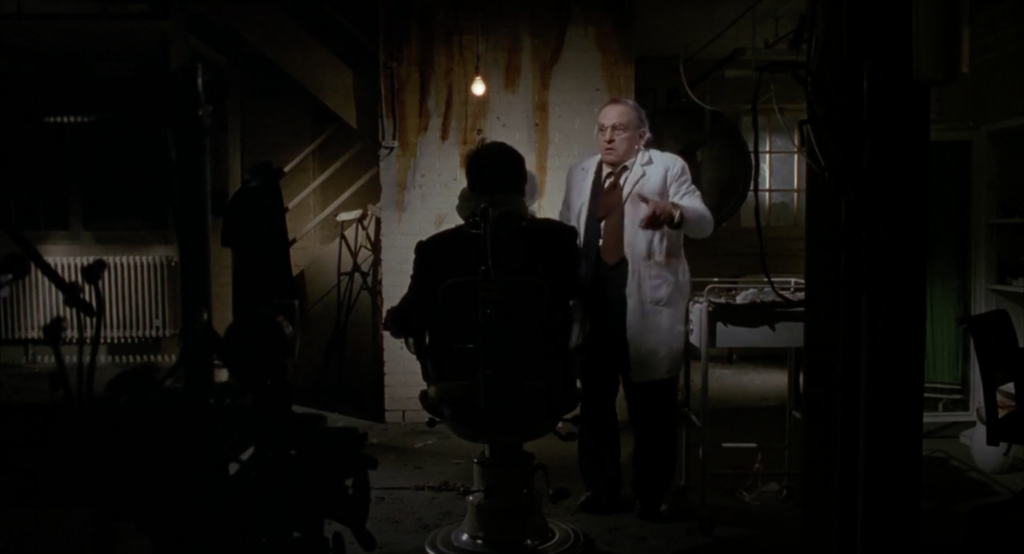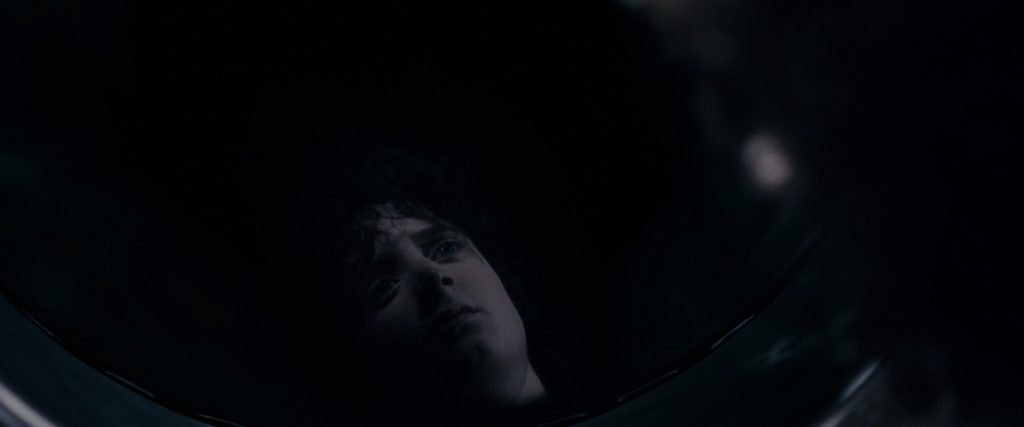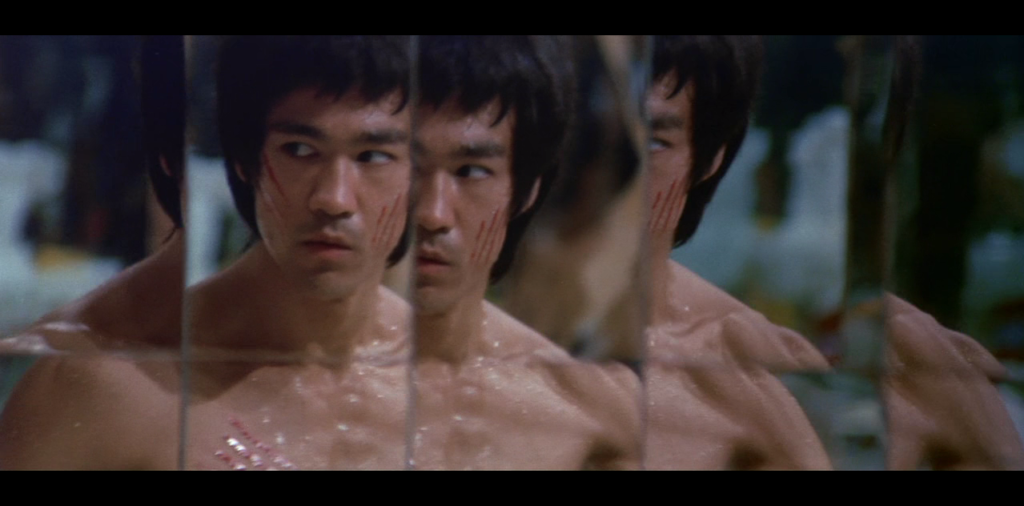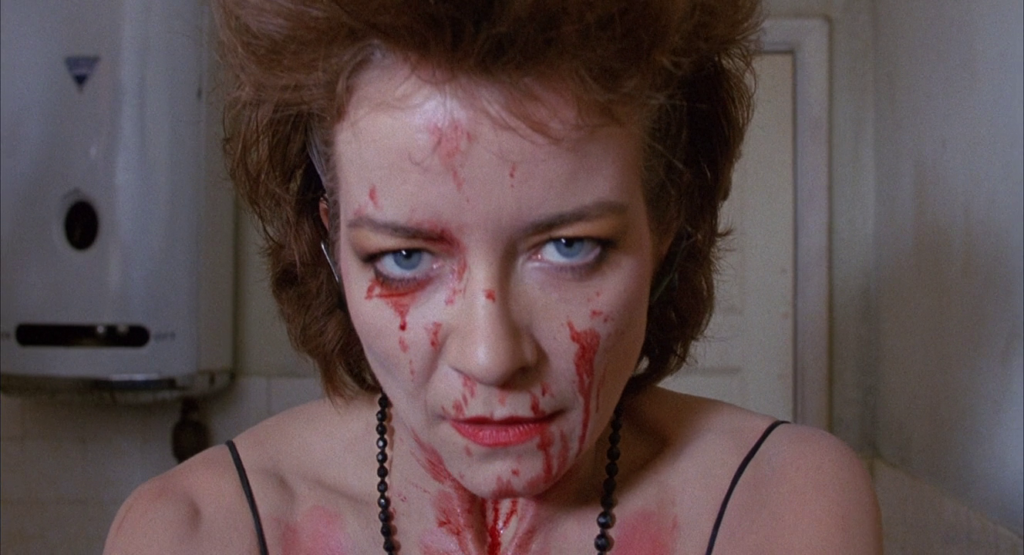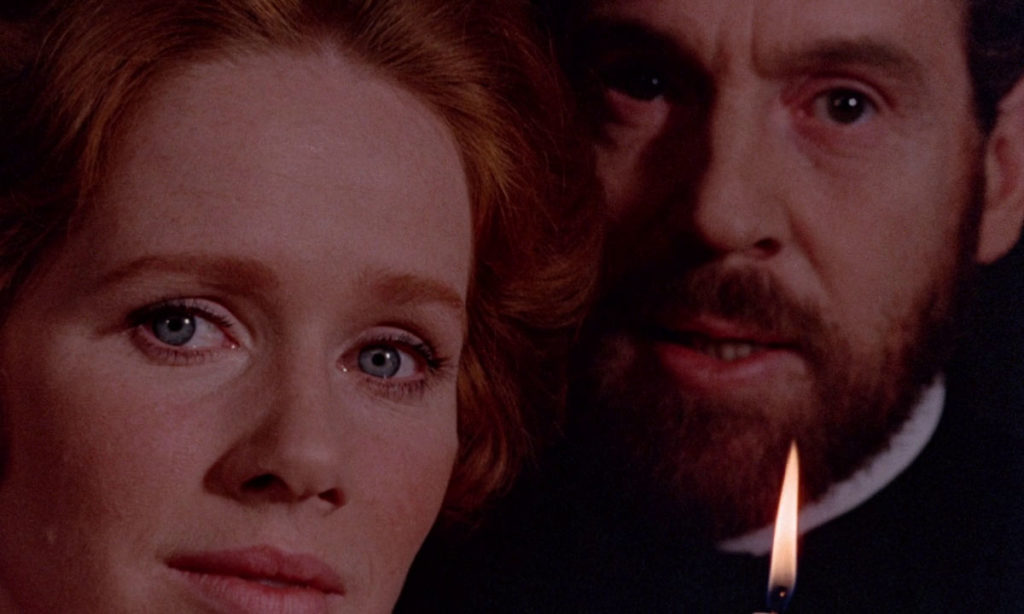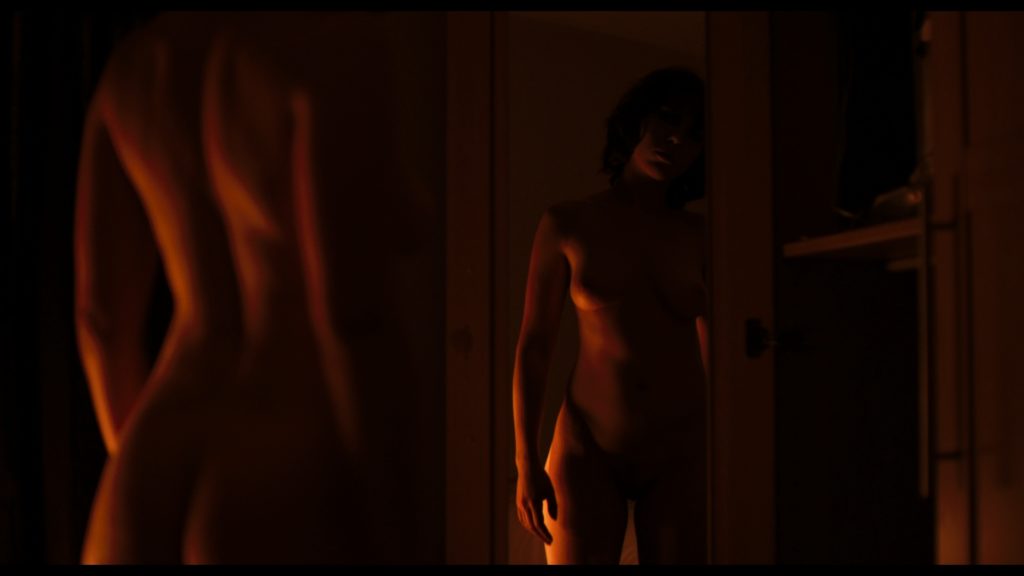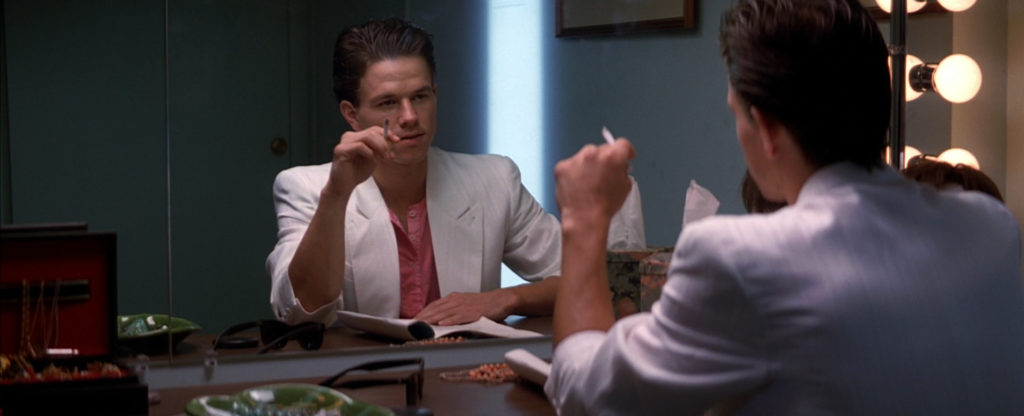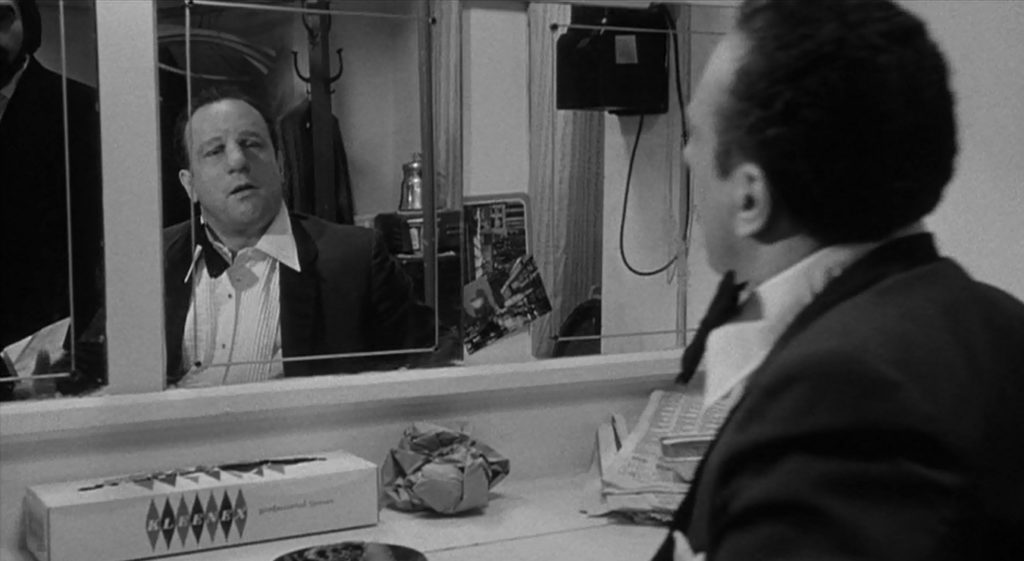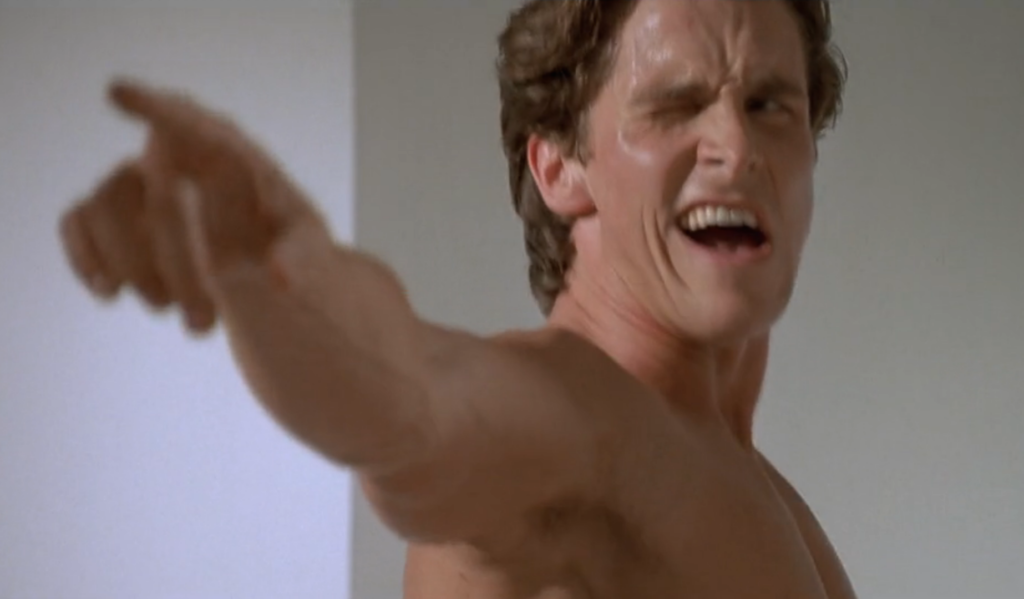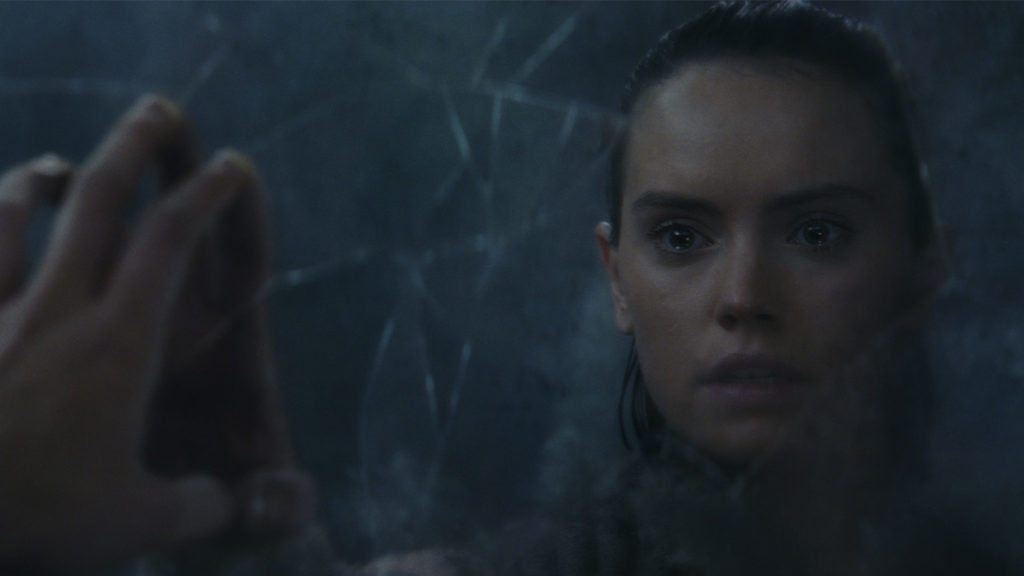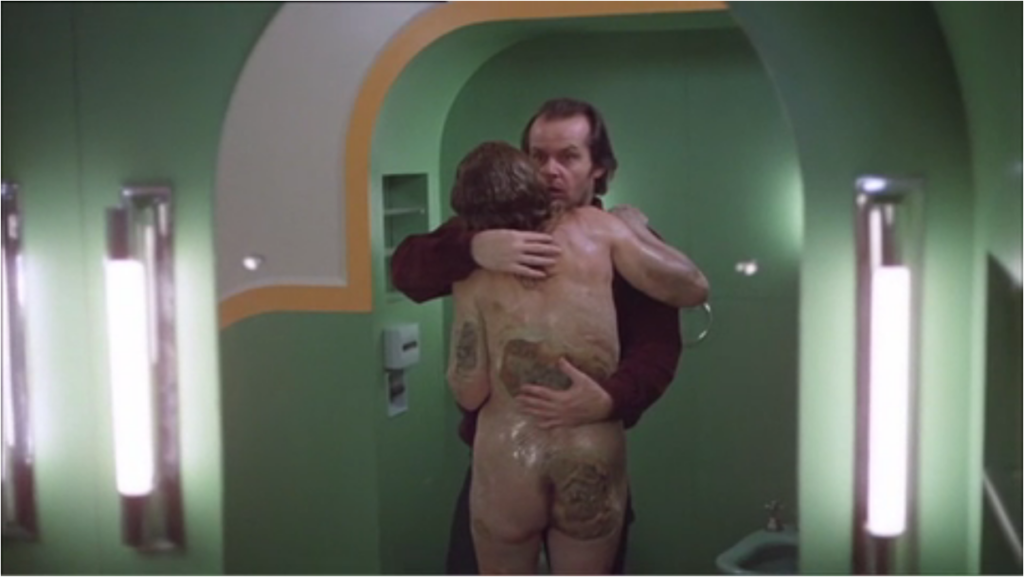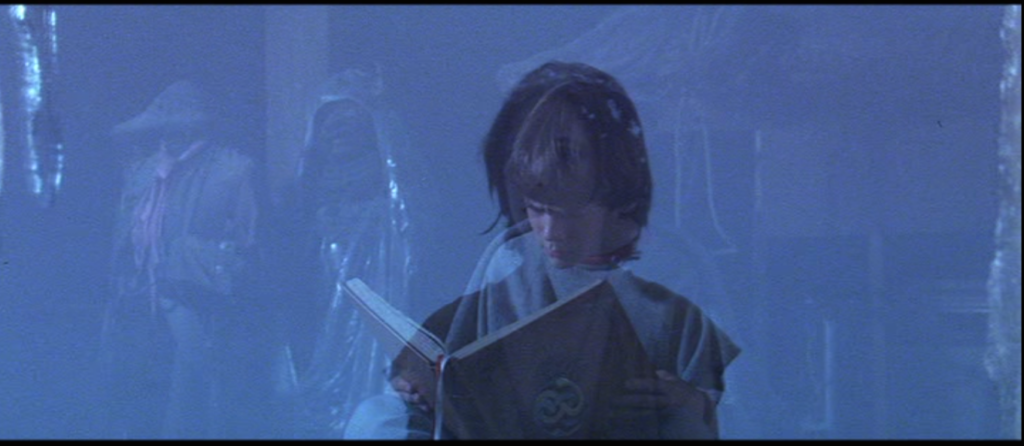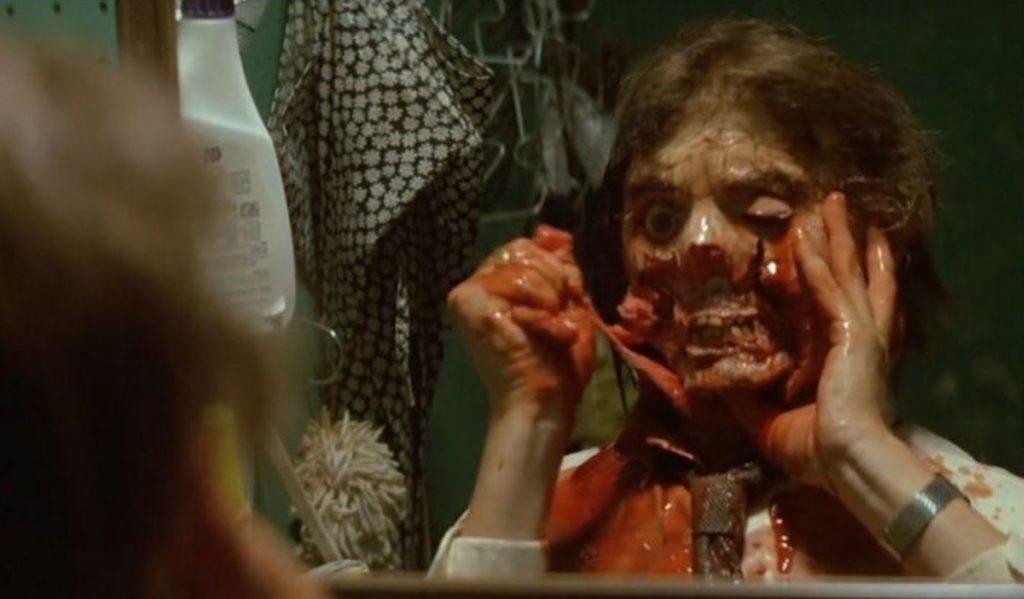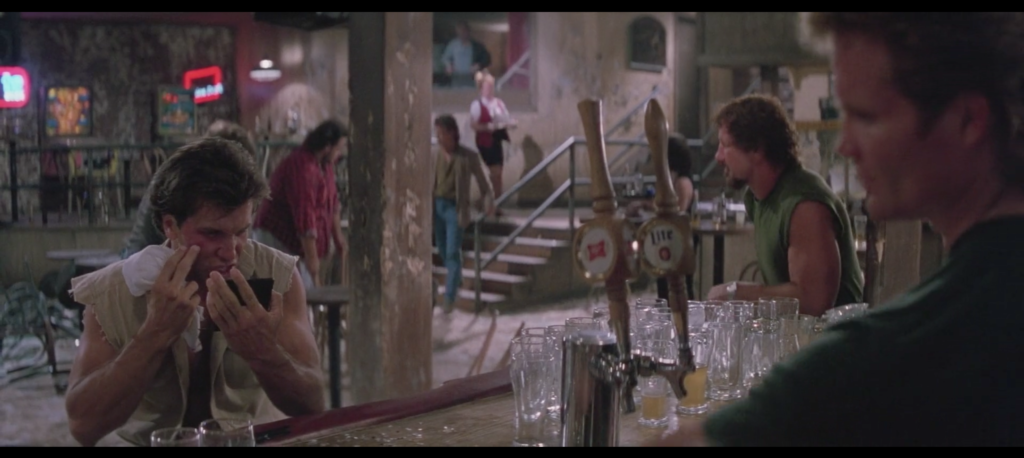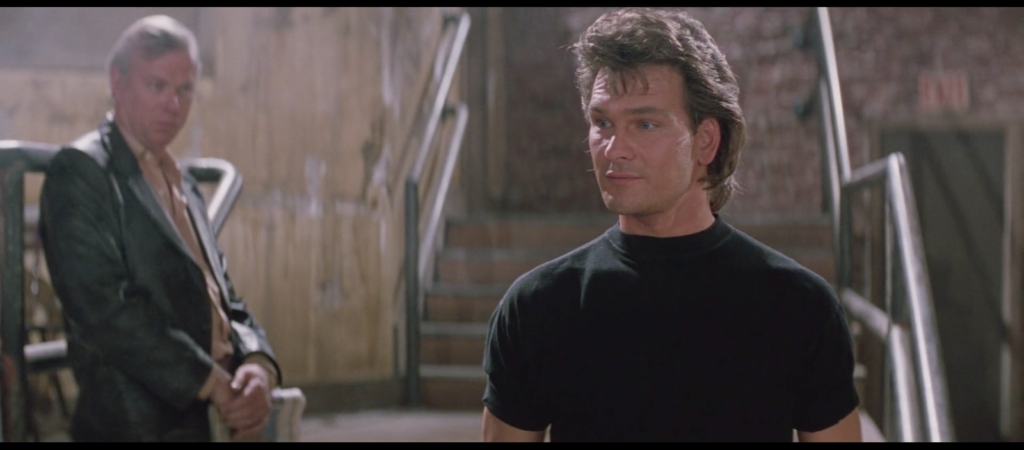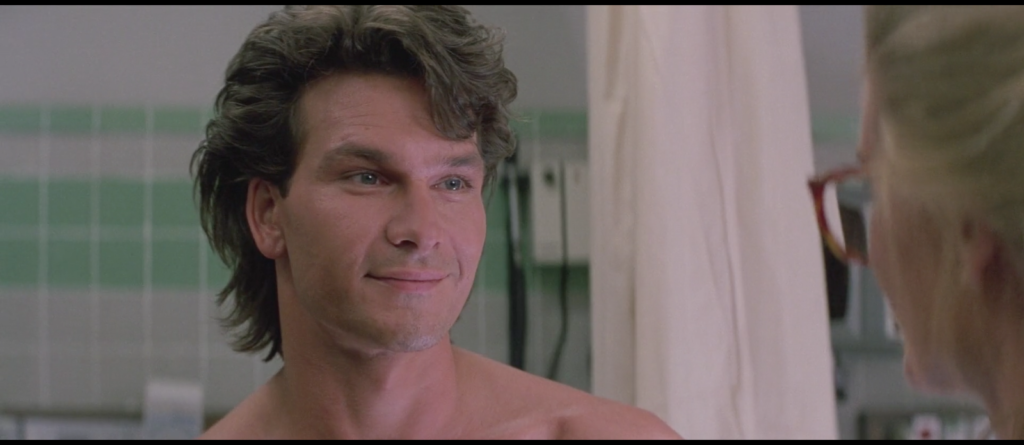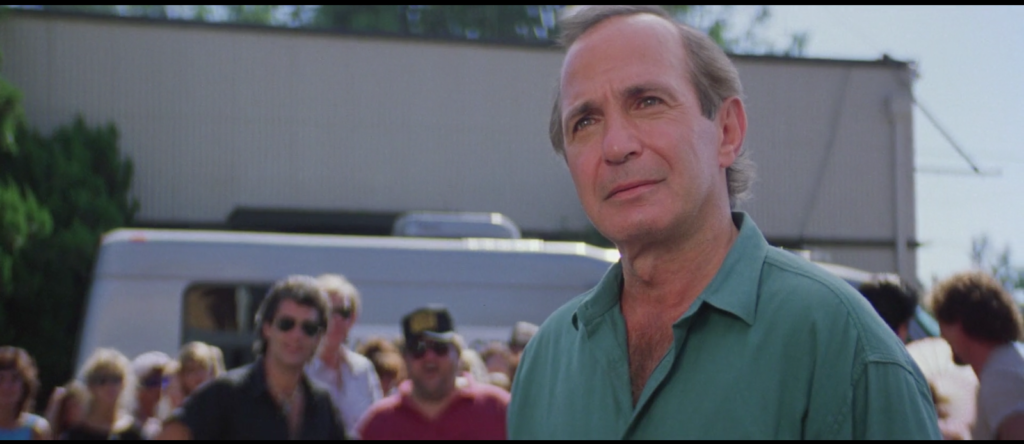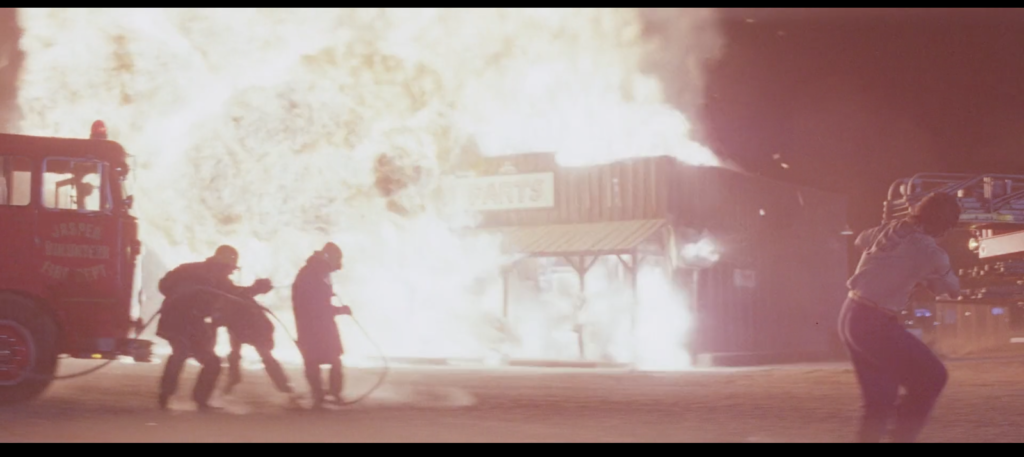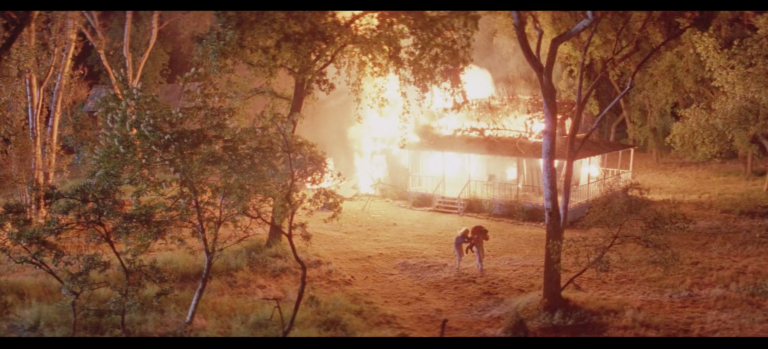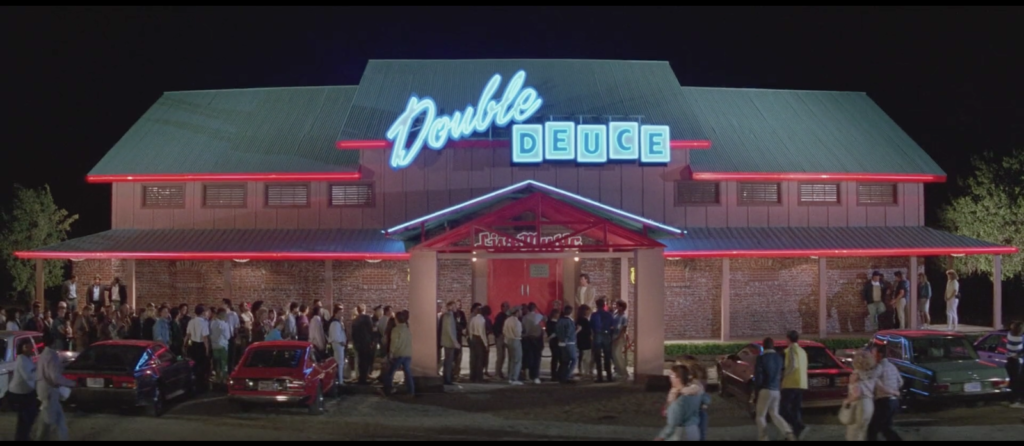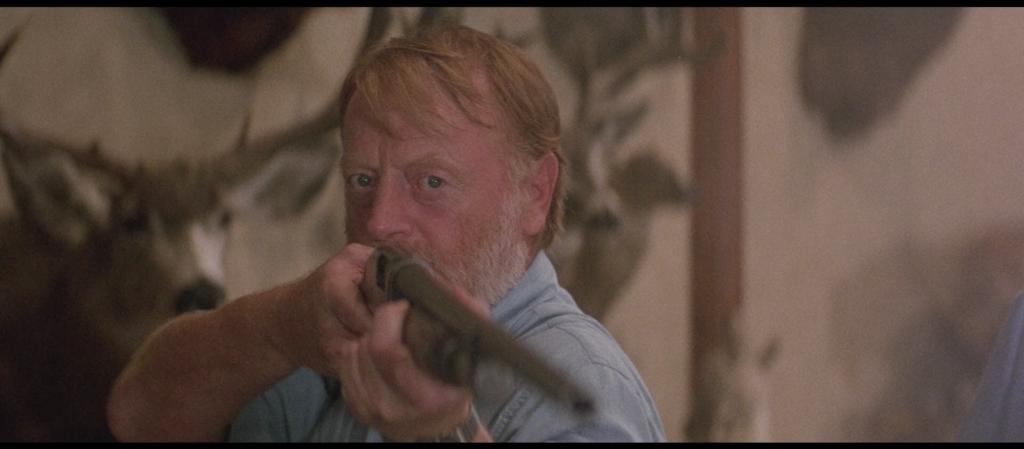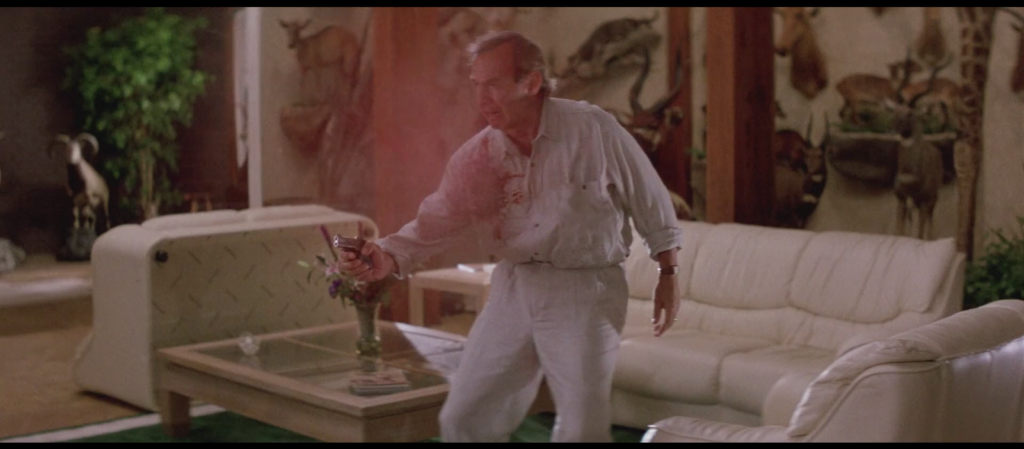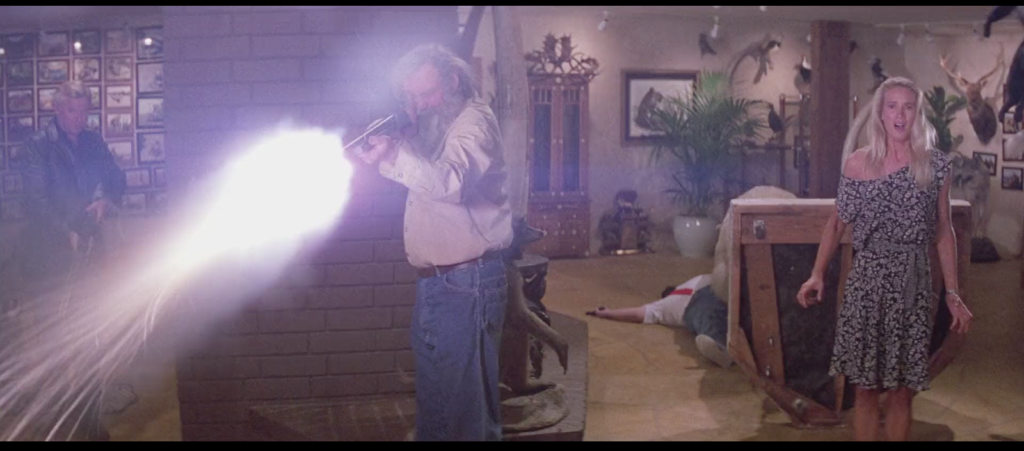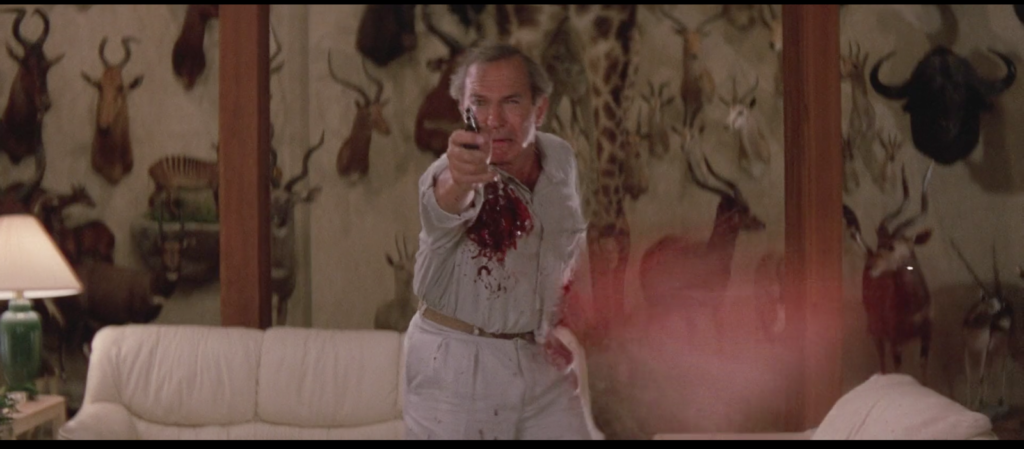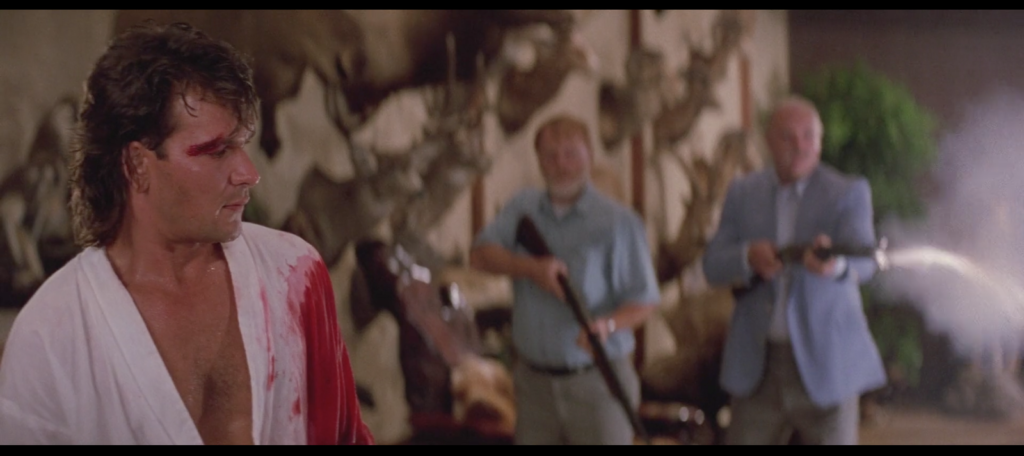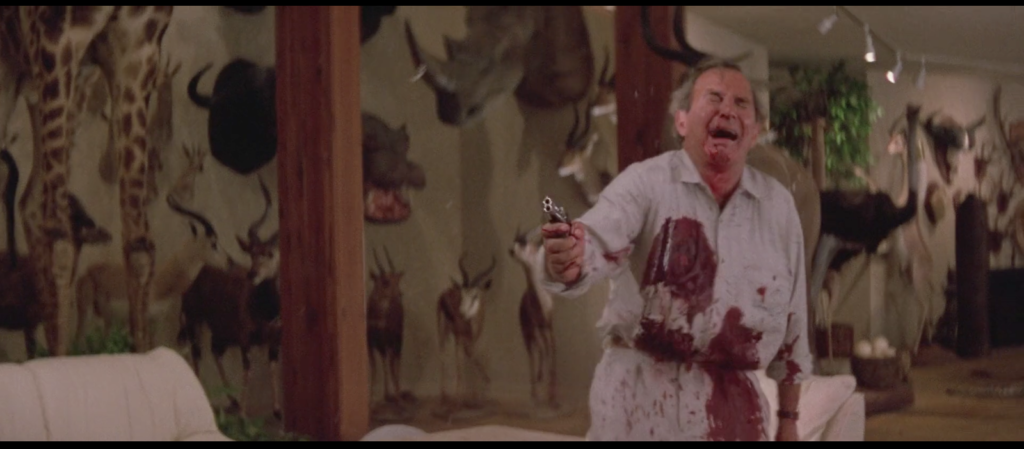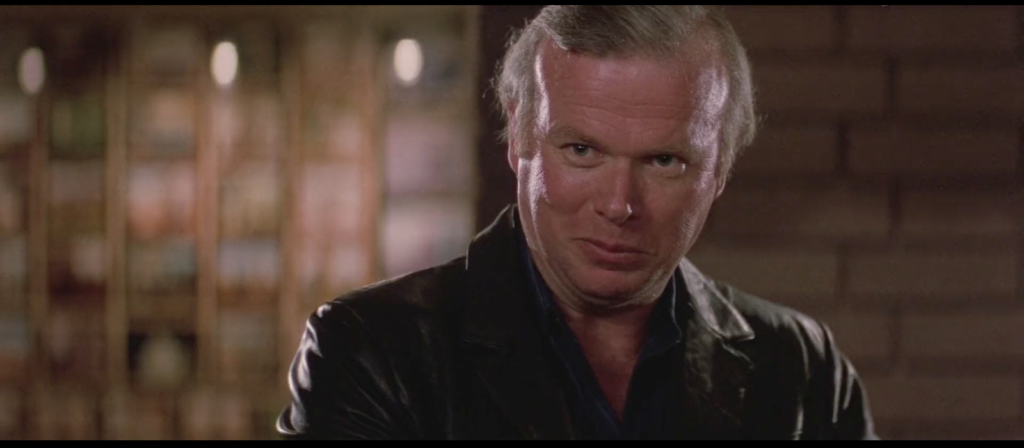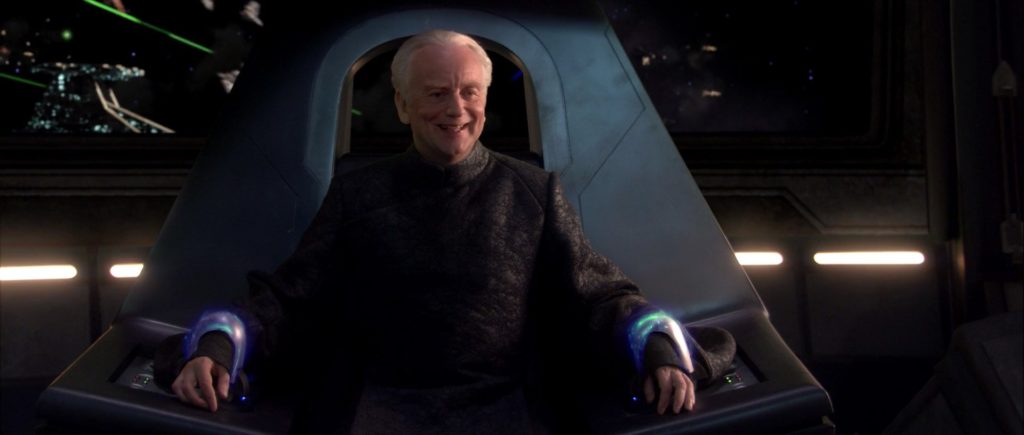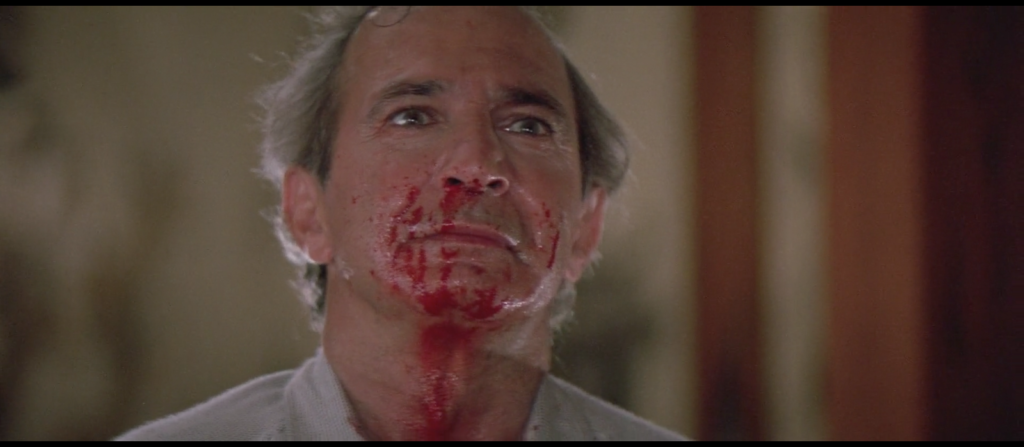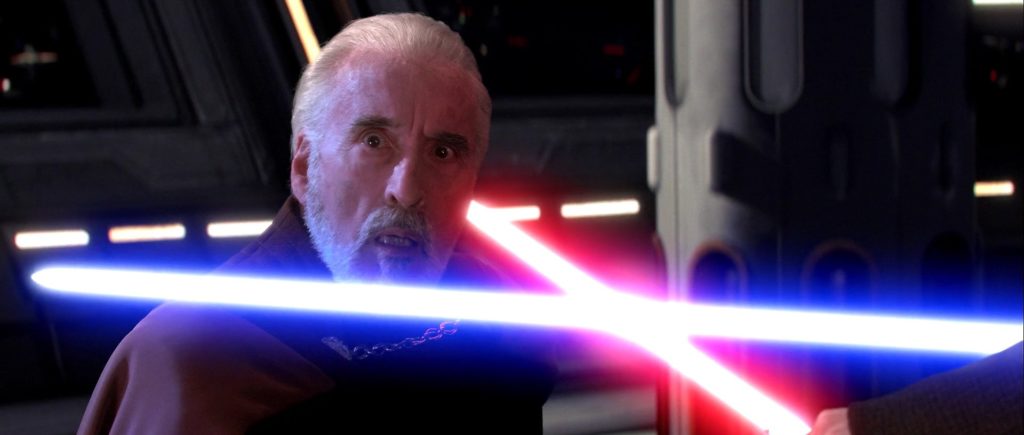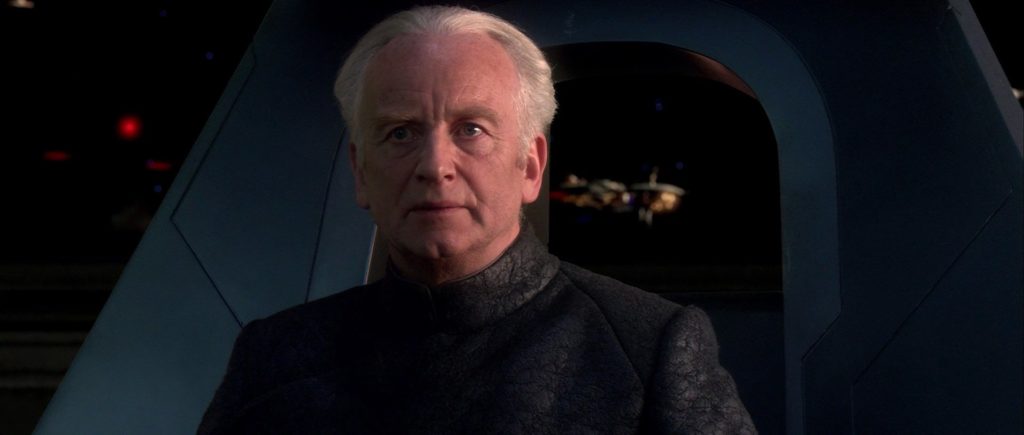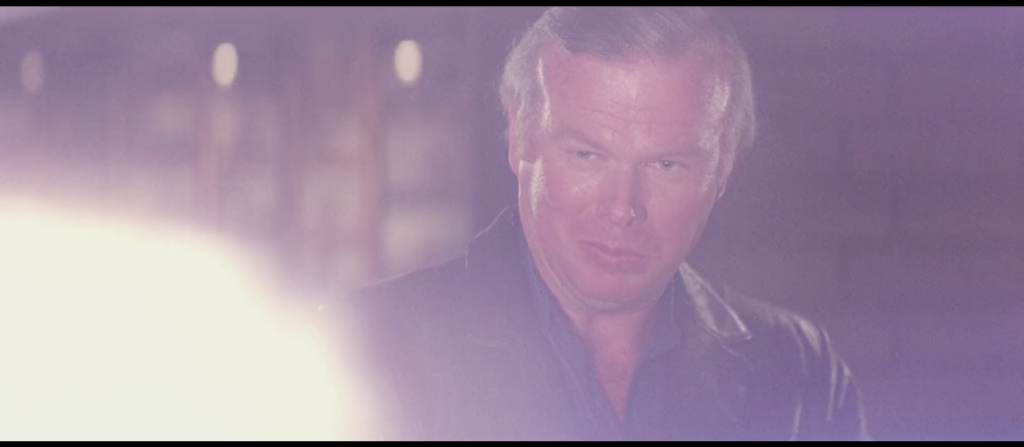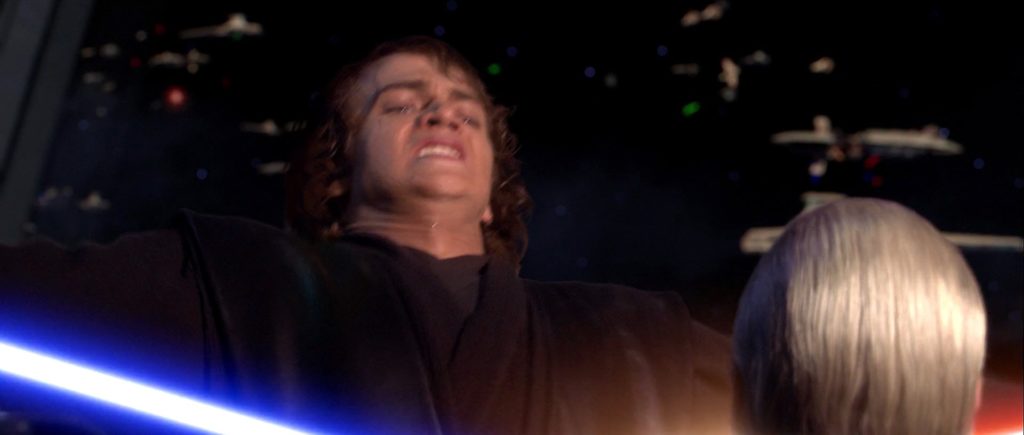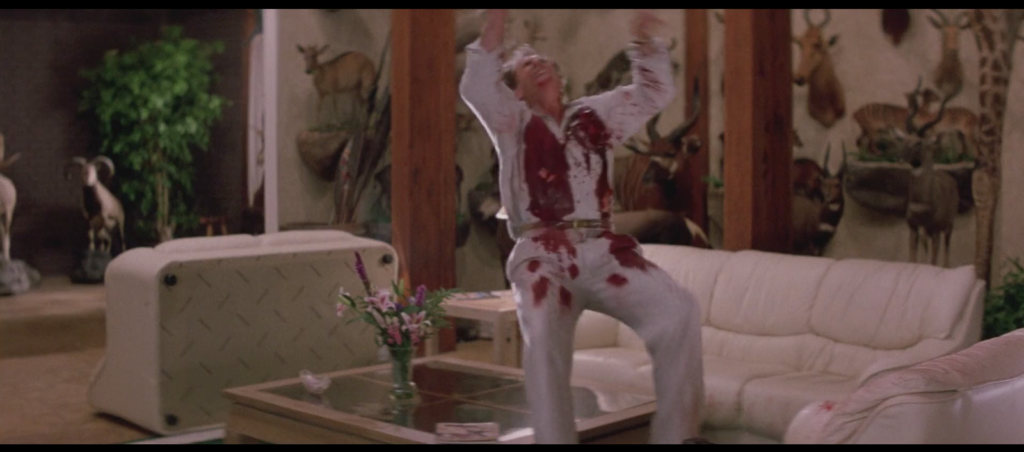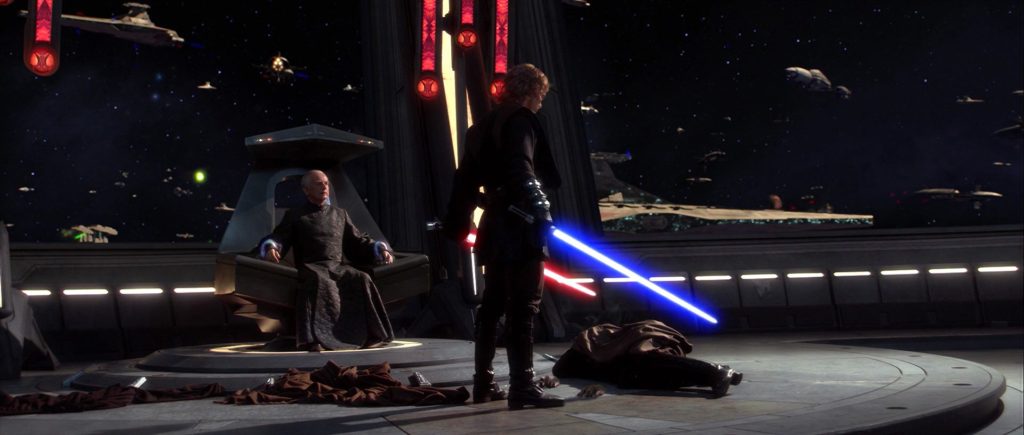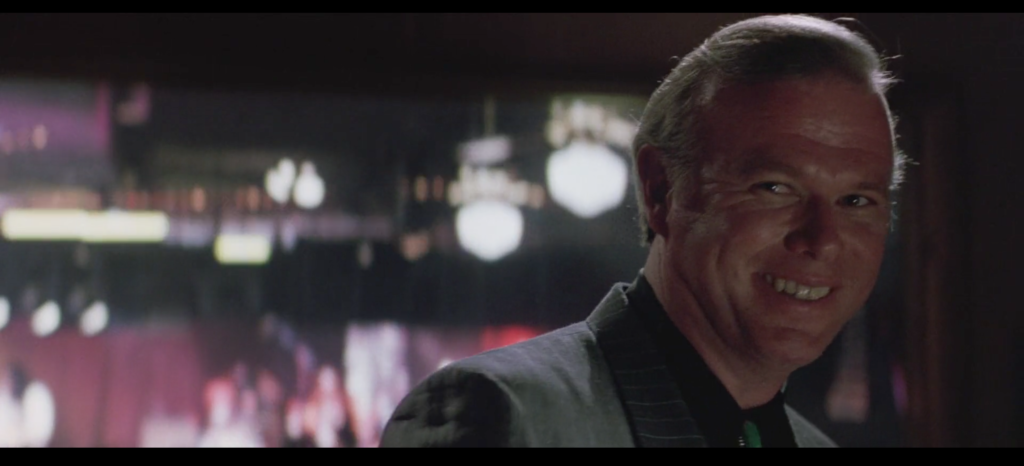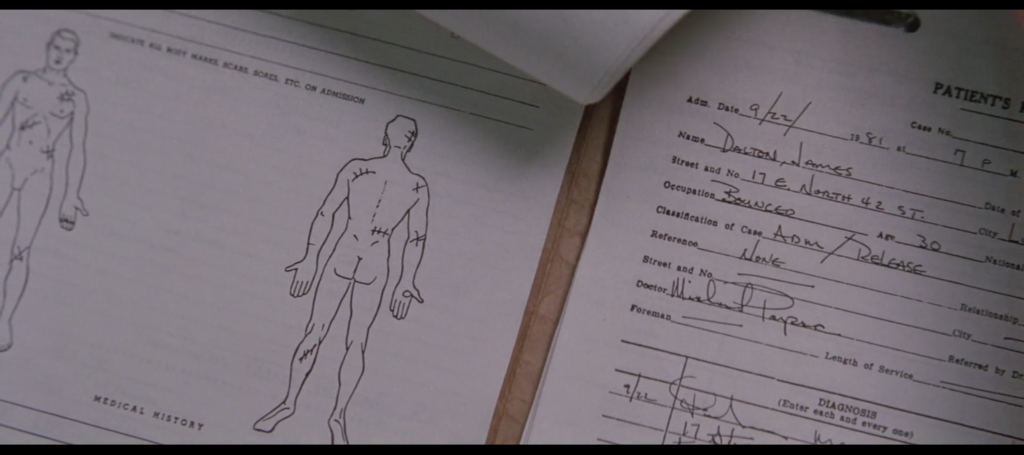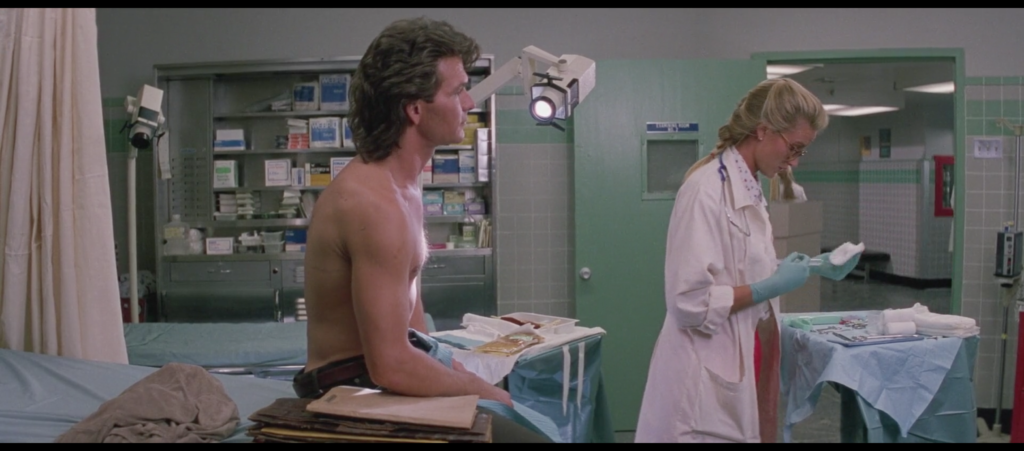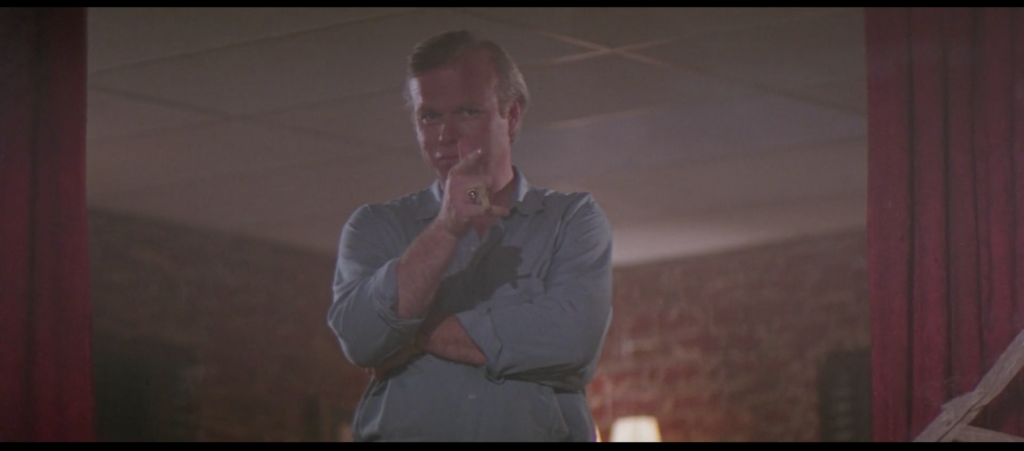Broad-shouldered, slim-waisted, corded with muscle, Dalton’s back is a perfect thing, an inverted arrowhead of sex. The sun glistens and gleams from every sweat-soaked ridge and cleft. At times you’d swear it’s a source of light itself. The camera orbits Dalton throughout his riverside tai chi routine and his whole body, or at least the upper half which is mostly what you see, is a marvel of course. But his back looks like it was manufactured, by the company who designed the clockwork opening credits for Game of Thrones maybe, or the people who adapted H.R. Giger’s artwork into sculptures for his house. During his waterside tai chi routine both Emmett, his friend, and Wesley, his enemy, stop what they’re doing and just…stare. It’s impossible to blame them. Or us. Dalton’s character is built on the sense that his many aspects—fighter, lover, road warrior, philosopher, rich famous guy, aw shucks everyman, killing machine, pacifist, beer-drinker, binge-reader, master, apprentice—all work in concert to make the man. Road House too, when appreciated properly, is less a film than an ecosystem: hyperefficient factory-made late-’80s star vehicle, barely competent incoherent MST3K fodder, rock-solid action flick, more obvious than usual homoerotica, smarter than it looks, dumber than it realizes, a Ben Gazzara film, a Terry Funk film. When you watch Dalton’s flawless, godlike arms and traps and shoulderblades flex and contract in harmony, you’re watching the character and the movie in metonymy. You’re watching a real physical thing, Patrick Swayze’s beautiful beautiful body, do what Patrick Swayze’s character and Patrick Swayze’s movie are also doing. As below, so above.
“The Act” thoughts, Season One, Episode Six: “A Whole New World”
When the murder happens, it happens fast. It happens offscreen. It happens without even the presence of the camera within the house where it takes place — we’re trapped outside and they’re trapped inside, and then it’s done. This week’s episode of The Act behaves a lot like I imagine Gypsy Blanchard and Nicholas Godejohn behaved the night they murdered Gypsy’s mother Dee Dee: like they just wanted to get it over with as quickly as possible and move on with their lives.
106. Sightings
Flipping through my copy of Road House today, waiting for inspiration to strike, I came across one of my favorite goofy moments in the movie: Brad Wesley stopping his ATV, which he’d been driving around he lawn of his mansion or something I guess, in order to watch and gently scoff at Dalton doing tai chi across the river. The combination of factors at work here—a shirtless and glistening Patrick Swayze performing tai chi on the Missouri farm where he lives during his stint as making six figures at a local shithole as part of his career as a famous bouncer, a deranged JC Penney enthusiast finding this interesting enough to park his Big Wheels and watch but ultimately come away unimpressed, as if he’d expected better form, or a dryer torso—is irreplicable in any other film.
But something hit me about Dalton, as seen from Wesley’s point of view in this moment. Something that I have seen in another film, albeit not a feature. Something that comes close to capturing our sense, and perhaps Wesley’s sense too, that when we look at Dalton we’re seeing something that defies comfortable categorization. Something wild, mysterious, dangerous, untamed, and all but extinct.
The Horror of Game of Thrones Goes Way Beyond Jump Scares
But the worst thing about the army of the dead and each of its individual members isn’t what they do, or who they do it to, or what they do with them afterwards — it’s that they’re able to do anything at all. They exist, and by existing they issue one huge collective FUCK YOU to all that the living characters’ hope for the future and all they hold sacred from their pasts. Whoever you used to be before the White Walkers get to you and kill you is gone when they bring you back. Your existence is cruelly prolonged, but you’re as mindless and dangerous as a sword in their hands.
This is easily the most ineffable aspect of GOT horror, and it requires a certain Potter Stewart “I know it when I see it” mind-set to grasp. But again, think of Ned Umber, this adorable kid who started the episode by awkwardly attempting to be as polite as possible to the very intimidating ladies and lords in charge of Winterfell. That he deserved better than to be murdered and nailed to the wall is obvious. Yet when he opens his eyes and starts flailing and screaming, and when he keeps screeching as he’s slowly burned back to death, you get the sense that something really awful is happening here, something worse than just a standard crypto-fascist Walking Dead zombie kill.
When I watched this scene, I didn’t reach for zombie movies or shows for a point of comparison at all. Instead I thought of the passage from The Lord of the Rings that explains that orcs and trolls were created as a “mockery” of Elves and Ents, races that were generally wise, kind, thoughtful, and caring of the world around them. Morgoth, the original Dark Lord of Middle-earth, saw them and decided to show his enemies exactly what he thought their innate freedom and nobility was worth: a bunch of hideous ravenous sadistic idiots who thrive in darkness and eat people alive.
I thought too of how Bram Stoker and Stephen King describe vampires in Dracula and Salem’s Lot respectively. It’s not just that they’re mean-spirited, bloodthirsty, and possessed of dangerous powers. It’s that they’re wrong, somehow, in a way the humans who encounter them feel in their guts. They’re not just scared of the vampires; they’re disgusted by them. They find them somehow lascivious and obscene in their persistence after death. In both books, the protagonists seem to want to destroy their undead enemies not just to be safe from them, but to be rid of them — to avoid ever having to look at their fanged faces or hear their sepulchral and somehow bogus voices again.
I wrote about Game of Thrones and horror on the occasion of the Season Eight premiere for Vulture.
105. Fate
One hundred essays into a year-long Road House writing project, I feel about the film’s attempts to coin catchphrases and aphorisms exactly the way I felt when I’d written no essays at all: yikes. I mean, Does a hobbyhorse have a wooden dick, folks. Balls big enough to come in a dump truck. The writers have a relationship with the English language only slightly less estranged than their relationship to male sex organs.
But they can’t all be losers.
Just after the dump truck incident, a grumpy Morgan (there is no other kind of course) stomps over to Cody, whom he knows has a preexisting relationship with their mysterious new colleague. “This Dalton character,” he grumbles, “what’s his story?”
“His story is, you fuck with him and he’ll seal your fate,” Cody replies.
Now that’s how it’s done.
It’s a marvelous exchange insofar as it’s a rare moment when two characters have a conversation during which Dalton is neither a participant nor present. These are few and far between in this film, to the point where they stand out like sore thumbs each and every time. Off the top of my head, there’s this conversation, there’s Brad Wesley beating up the bleeder, Wesley and Jimmy talking to Red briefly after Dalton departs his store, and Jimmy and Ketchum spying on Dalton and Elizabeth from afar. Unless you count Wade Garrett breaking up shenanigans at a strip joint prior to receiving a call from Dalton, or Wade Garrett asking for Dalton’s whereabouts when he arrives at the Double Deuce, or Wesley’s goons making small talk prior to Dalton’s final assault on the Wesley compound, or Steve and Agnes doing their regular Saturday night thing before Dalton pops in and fires him—all of them scenes that exist so that Dalton can join them in progress—that is it. This is Dalton’s world, and what a treat to see other people live in it.
And who are the people in question this time around? Blind white blues musician Jeff Healey and hardcore wrestling legend Terry Funk. For Road House fanatics this is like the De Niro/Pacino diner scene in Heat.
But don’t think it’s just some goofy novelty act. (I didn’t say “Don’t think it’s some goofy novelty act,” mind you, I said “Don’t think it’s just some goofy novelty act.) Throughout this project I’ve been impressed by what the…let’s say non-traditional actors bring to the table. The naturalism Terry Funk brings to his role as an enormous man who gets paid to get angry and beat the shit out of people with tables is obvious. But spare a thought for Jeff Healey, too, who sounds like exactly what he is supposed to be: a guitar player chatting with dudes in bars. It works when he’s serving as a welcoming presence for Dalton, the one character he neither needs to intimidate nor impress, and it works when he drops the “hey man lemme put this here guitar down and buy you a beer” schtick and describes his friend like he’s the fucking Shogun Assassin.
Because that’s the message of “you fuck with him and he’ll seal your fate,” isn’t it. He won’t just kick your ass, or kill you, or make you wish you were never born or blah blah blah. Like a Norn with a mullet, he’s got the thread of your life in his hands, and if you step to him you’re going to find out exactly where that thread ends.
There’s another implication here that must be considered: Fate is predestined. Cody’s description of Dalton, then, is of one who will mete out the appropriate and appointed sanction to those who cross him, no more and no less. Perhaps it will be your fate to disappear from the movie a third of the way through and never return, like Karpis. Perhaps it will be your fate to pass out from terror when a stuffed polar bear is dropped on you and then emerge reborn, your sins forgiven, like Tinker. Perhaps it will be your fate to be murdered offscreen while wearing moonboots, like Morgan. Whatever the case, Dalton is not making the news, he’s simply delivering it to your doorstep.
It’s precisely the right description for the Dalton Path. Remember Rule Three, Verse Four: “It’s a job. It’s nothing personal.” What can be more impersonal than fate? And who better to do the job of sealing it?
104. I Thought You’d Be Bigger Vol. 2: Cody
For a recurring joke, “I thought you’d be bigger” gets deployed with a pretty broad affect range. The first person we hear say this to Dalton is Frank Tilghman, whose delivery is difficult to characterize in any way but sexual. The second is Cody, lead singer of the Jeff Healey Band in the Road House Universe, and his delivery could not be further removed from his and Dalton’s mutual employer.
Dalton arrives at the Double Deuce, takes in the scenery, and discovers that the bar band are old friends. He sneaks up on the lead singer with the help of his identical and yet somehow not related bandmates, with a theatrical finger-to-the-lips Marian-Madam-Librarian “shhhh” gesture he shares with each. He hands Cody a towel to mop up the accumulated sweat and projectile beer on his face, for which Cody thanks him. “You play pretty good for a blind white boy,” Dalton says, beaming. Recognition dawns in Cody’s face. “Yeah, and I thought you’d be bigger,” he jokes, and the two embrace, laughing.
I’m gonna level with you: I love this moment. Why? Because it’s one of the only times in the film where Dalton is completely at ease. He’s been reunited with an old friend, a peer, not someone he has to impress, not someone he has to instruct, not someone who mentored him, not someone he needs to mentor. They know each other well, but as colleagues rather than sensei and student. They pass feverish gossip about old times and current times: “Man, this toilet is worse than the one we worked back in Dayton,” Cody says. He also mentions that he and “the boys” heard Dalton was headed to Jasper, presumably from Tilghman, although word among barfolk travels far and fast of course. Dalton therefore does not need to dazzle Cody, nor earn his respect. Cody’s been sitting on his barstool on stage, guitar in his lap, waiting to welcome Dalton with open arms. Anyone would be happy to step into that situation.
But most important of all is that this exchange is just that: an exchange. Dalton ribs Cody in a way he is, presumably, accustomed to being ribbed—that his chosen genre and evident skill are anomalous given his race and disability. Cody thinks this is funny to hear, which indicates he’s heard it a million times before. He uses “I thought you’d be bigger” as a riposte, indicating that these two have shared late-night “You know what people say to me all the time and totally drives me nuts?” conversations over Miller Genuine Draft when the patrons of that toilet in Dayton have long since retired for the evening.
The point I’m trying to make is this: While Tilghman’s “I thought you’d be bigger” is off-putting and invasive, Cody’s is familiar, friendly, and inviting. Eat your heart out, Snake Plissken and “I heard you were dead.” Patrick Swayze and Jeff Healey just took you to catchphrase school.
“Game of Thrones” thoughts, Season Eight, Episode One: “Winterfell”
Winter is here, and it’s taking us deeper into the world of Game of Thrones than ever before … in the opening credits, anyway. For its final season, HBO’s era-defining fantasy saga has given the famous clockwork map that accompanies Ramin Djawadi’s unmistakable opening theme a complete makeover. Instead of simply gliding over the various lands and castles of Westeros, the title sequence now takes us inside them — from Winterfell’s crypt to the Red Keep’s throne room.
The premiere that accompanies the new credits, however, is content with surface-level pleasures. Rousing, crowd-pleasing and often very funny (how many GoT episodes can you say that about?), the kickoff for the show’s eighth and final season brings long-estranged characters together at an unprecedented pace, like it’s checking off items on a shopping list for a fan-service speed run. It’s great fun. But is it, you know, great?
I reviewed the season premiere of Game of Thrones for Rolling Stone. Please note that these review descriptions will remain brief while I play linkblogging catch-up, so you’ll have to read the reviews to know more!
“Billions” thoughts, Season Four, Episode Five: “A Proper Sendoff”
This week on “Billions,” revenge is the order of the day. All right, fine: Every week on “Billions,” revenge is the order of the day.
I reviewed this week’s episode of Billions for the New York Times.
103. Dump truck
This much, at least, is not in dispute: When Dalton’s first night at the Double Deuce is winding to a close, Morgan, who is skeptical about the man’s physical prowess, tells him the following.
“You know, I heard you had balls big enough to come in a dump truck, but uh…you don’t look like much to me.”
“Opinions vary,” Dalton replies, and Morgan is temporarily bested.
But while that may settle the issue for the involved parties, we are left with unanswered questions. To wit: When Morgan says he’s heard Dalton’s balls are big enough to come in a dump truck, does he mean A) a dump truck is required to carry them on account of their large physical size, or B) a dump truck is required to receive Dalton’s ejaculate load due to the copious amounts of semen his big balls produce? “Come” as in “arrive,” or “come” as in “cum” as in “ahh skeet skeet motherfucker”? As Dalton himself might say, opinions vary.
Below you’ll find the best cases I can make for and against the two competing interpretations.
Morgan means “come” as in “travel”
PRO:
- Saying someone has “big balls” is a way of saying they’re unusually gutsy or tough, traditional characteristics, one would think, of a famous bouncer
- Dump trucks are known for carrying things placed in them and can accommodate substantial size and weight, making for a strong metaphor
CON:
- Placing his gargantuan sack in a dump truck would leave the rest of Dalton’s body at something of a loss were the truck to go anywhere, the Double Deuce’s parking lot for example
- Dump trucks typically transport dirt, rubble, or refuse, none of which describe Dalton’s testicles
Morgan means “cum” as in “bust a nut”
PRO:
- The measure of a man’s balls could in theory be taken by the size of the receptacle required to contain a full emission of his seminal fluid; from this we can infer that were the bed of a dump truck required to catch all of Dalton’s ropes in their entirety, his yarbles must needs be very big indeed
- Simply weighing or determining the circumference of Dalton’s ballbag implies passivity on his part, while the thought of Dalton milking, or causing a third party to milk, his dick into the back of a construction vehicle demonstrates the activity and agency becoming of a bouncer
CON:
- Dump trucks are not recommended vehicles of liquid waste; absent a watertight truck bed Dalton’s jism could seep through the seams and on to the road surface below, causing a potential traffic hazard and thus negating the central idea of the metaphor as a means to convey his professional clout and skill
- The size of Dalton’s cock, which due to the nature of the orgasmic process would play an indispensable part in the process of cumming into a dump but not in the process of simply transporting Dalton’s huevos in one, goes conspicuously unremarked upon
CONCLUSION:
Occam’s razor suggests Morgan means he’s heard that Dalton’s balls are so big he would not be surprised to see them being carried by a dump truck, not squeezed like lemons into one. However, the imagistic approach of the latter interpretation has much to recommend it as a hypothetical alternative.
101. The Third Rule, Verse 4
“This is the new Double Deuce,” says Frank Tilghman. We are at the start of an all-hands staff meeting, and Tilghman is pointing to the concept art for the bar’s redesign. But standing nearby is his latest hire, Dalton. It is through Dalton, with Dalton, in Dalton that the new Double Deuce will be achieved. Dalton embodies the new Double Deuce. He is its future.
When Dalton takes over as cooler he becomes more than just the chief bouncer. His role is not to handle a series of discrete incidents, but to institute sweeping reforms that will eliminate such incidents forever. “It’s going to change,” he states—not a threat, not a promise, a fact. His bouncers, too, must change for this to take place. As below, so above.
Bouncing on the Dalton Path is a matter of following “three simple rules.”
This, for the fourth time, is the third.
3. Be nice (continued)
“I want you to remember,” says Dalton, “that it’s a job. It’s nothing personal.”
Thus far, Dalton has explained the third and simplest of his Three Simple Rules in comparatively painstaking detail. He has articulated its Great Commandment. He has preached the Parable of Someone Getting in Your Face and Calling You a Cocksucker. He has emphasized its communal nature. And now he says it’s nothing personal?
I’d like to take this opportunity to introduce you to a man named Gyp Rosetti.
ROSETTI: “Bone for tuna.”
TONINO: What?
ROSETTI: “Bone for tuna.” What the fuck’s that’s supposed to mean?
TONINO: Oh. The kid’s Irish. The pronunciation was off. I think he meant—
ROSETTI: I know what he meant. Who the fuck is Nucky Thompson to wish me good luck? And in Italian, no less, like he’s mocking me? He’s real cute, I’ll fucking tell you. Sets me up to lose, pulls our whiskey deal at the last minute, then it’s buon fortuna like he’s rooting for me to get back on my feet. Push me off a cliff, why don’t you.
TONINO: Sure, I mean—
ROSETTI: Good luck flapping your arms on the way down! Am I right?
TONINO: Sure, I mean—
ROSETTI: Real attitude on him. Scrawny Irish prick. I need his blessing to make my way in the world?
TONINO: He w—
ROSETTI: I need him? To lecture me? “Nothing’s personal”? What the fuck is life if it’s not personal?
So you can see Dalton’s dilemma. Here he is, new in town, new in the job, new to these men, whose job it is to physically fight, restrain, and eject other men. His first order of business is to fire two of their coworkers, neither particularly well-liked, but each emblematic over his power over their employment and thereby their lives. He’s told them It’s my way or the highway and rattled off a list of undesirables who frequent the bar, a state that’s going to change. The implication is clear: His way is superior to theirs, which has demonstrably failed. From there he launches into a disquisition on bouncer conduct that is rife with paradox and contradiction as well as comprising a nearly diametrically opposed approach to the craft than that which they have heretofore pursued. After all this, after telling these violent men how to do their violent jobs by moderating their interactions with other violent men under the threat of termination, Dalton has the temerity to tell them that when the time comes and they are being pelted with verbal and physical abuse and they must decide whether and how to strike back, that all of this is nothing personal? Doesn’t he see how they would take this? Doesn’t he know it reads as insanely pollyannaish at best, insulting at the most reasonable, and downright dangerous at worst? When confronted with well-meaning advice by someone with whom you are at odds—and what is a worker if not at odds with the boss—even the most anodyne bromide, like wishing an associate “good luck” in his native language when a business deal goes south, feels like fighting words. Doesn’t Dalton realize that telling these men in this context that this job is nothing personal is tantamount to throwing down the gauntlet and fucking daring them to take it personal?
Yes. Yes he does.
If you think this sentence is confusing, then change one pig.
(to be continued)
100. Pain don’t hurt
Look, all he’s saying is that it doesn’t bother him that much. Why would you doubt him? You’ve just read his life story in the form of a medical file. Thirty-one broken bones, two bullet wounds, nine puncture wounds, and four stainless steel screws. To these you are about to add nine staples, to close the knife wound he incurred in the process of physically fighting multiple armed attackers in his employer’s office. He’s a bouncer by trade, and taking it is as much a part of the job as dishing it out. More so, perhaps. The fight has to come to him, not the other way around. Until someone’s ready and willing and able to hurt him he’s off duty. So he turned down the anesthetic, so what. Pain is how he clocks in.
But there’s more to it than that, you suspect. Because the non-standard subject-verb agreement is…it’s cute, you guess, but you know he knows better. In that job, with that body—you’ll afford him the working-class hero affectation, but that’s what it is. Again, you’ve read his medical file. You know he went to NYU. You know he keeps this information in his medical file, for some reason. You suspect, in the minute you’ve known him you suspect, that he’s put real thought into the things he says, for better or…
Beautiful eyes. Blue. He has a blue-eyed smile, too, you think, unsure what that means, sure that it’s right.
You’ve been with violent men before. There, now you’ve thought it, now it’s out in the open. Not with you, never with you, not really, no not really, though you’ve heard things since then that you have a hard time believing yet also believe the moment you hear them. What’s that girl’s name? The blonde woman. She was with one of his boys, and you were with him, and you left town, and he went nuts, and now she’s with him and the boys have moved on, you suppose. Not with you, though, not really.
But Brad didn’t need to hit you to hurt you. His charisma, his worldliness, his ease with success, the way he promised you everything and meant it: When you saw it for what it was—for its casual cruelty and gross acquisitiveness and lack of empathy and small-minded understanding of what “everything” even means—and the life you’d planned to last forever kindled and burned and crumbled to ash in the light of it, oh, he hurt you then. He hurt you so badly you ran to get away from it, like the feelings lived in that godawful mansion and you could leave them there mounted on the wall, immobile, unable to reach you again.
Has he ever been hurt, you wonder? Hurt like that, you mean? Has Dalton comma James, he of the thirty-one broken bones, two bullet wounds, nine puncture wounds, and four stainless steel screws—and nine staples, don’t forget those—has this man who literally trailed blood into your hospital tonight ever tried to run away from the pain, only to learn just like you did that you take it with you no matter where you go?
You want to check his medical file for the answer. You wonder if maybe it’s on the same page that lists his alma mater. You want to laugh but that would be inappropriate.
But you have your answer. You may not want to believe it, because it’s safer not to. But the working-class hero with the NYU degree and the studiously sculpted body and the equally studiously sculpted speech, with the blue eyes and the smile, with the thirty-one broken bones and two bullet wounds and nine puncture wounds and four stainless steel screws and, soon, nine staples—he told you already.
He told you, when he said Pain don’t hurt.
No, you think. By comparison? No. No, it does not.
You’re still smiling, you realize, you’re still smiling and he’s still smiling as you turn to grab the stapler. As you feel his body through the latex of your glove and begin to repair what was broken you think Pain don’t hurt and you wonder how long the smiling will last.
“The Act” thoughts, Season One, Episode Five: “Plan B”
For the first time in her life, Gypsy Rose Blanchard has plans of her own. It’s 2015 now, and as The Act resumes for its fifth episode, she’s dressing up in provocative clothing to have cybersex with her internet boyfriend Nicholas Godejohn. She does this several times throughout the episode. It’s all kinds of blackly comic given Nick’s woeful lack of proficiency with regards to the dom-sub power exchanges the two enjoy. (In Gypsy, a woman whose entire life has been defined by her Munchausen-by-proxy mother and Disney movies, Nick, a man who blows his promotion at a pizza parlor, may have found the one person on earth he could convince to call him Daddy.) And since we know where it’s all headed, it’s sinister too.
099. The Phantom Menace
WESLEY: This is my town. Don’t you forget it.
DALTON: So what does he take?
RED: Who?
DALTON: Brad WesIey.
RED: Ten percent…to start. Oh, it’s all legal-like. He formed the Jasper Improvement Society. All the businesses in town belong to it.
DALTON: You’ve gotten rich off the people in this town.
WESLEY: You bet your ass I have. And I’m gonna get richer. I believe we all have a purpose on this earth. A destiny. I have a faith in that destiny. It tells me to gather unto me what is mine.
RED: Twenty years I’ve watched Wesley get richer while everybody else around him got poorer.
TILGHMAN: Anyway, I’ve come into a little bit of money.
TILGHMAN: This is our town. And don’t you forget it.
098. James
Dalton’s first name is James. There it is, in black and white, in his medical file, next to a drawing of his bare ass. (Not technically true, but you have to admit the resemblance is remarkable.) I forget this, frequently. I forgot it for the entirety of this project, until I happened across this frame while searching for something else in this scene, the one where he meets the Doc. Nothing’s gained by knowing Dalton is more than a mononym. For one thing, it costs him a certain air of humility. Jack, Hank, Younger, Ketcham, Karpis, Stella, Judy, the Uncredited Bartender—half the cast is not afforded the dignity of a name uttered onscreen. Why should Dalton be any different? Because he’s the cooler? That presupposes that, like Superman, he is like them but he is not one of them. That’s not a presupposition I’m willing to make. The Dalton Path is a path of humility, and you must trade in your Mercedes for a hooptie in order to travel it. I wonder if Dalton eschews the use of his first name, to the point where no one, not even his lovers and closest oldest friends, even use it, in order to annihilate the self in this way—like a maester dropping his house name, like a nun adopting the name of a saint, like Jack Napier calling himself Joker to represent his broader brighter outlook on life. Maybe that’s why my brain purges itself of this knowledge regularly, and then purges itself of the knowledge of the purging. It’s not like I could tell you when I learned Dalton’s name, but I know that I did, and I know I forgot it, and I know that I’m remembering it rather than discovering it for the first time, and I couldn’t tell you when any of those events originally took place. There’s a bit in Batman: Year One, by Frank Miller and David Mazzucchelli, where the young Batman must dive off a bridge to save the infant of the young James Gordon. In the process he removes his mask, or his mask is removed, or he was dressed as Bruce Wayne all along and had to blow cover to make the save, which was to him more important than preserving his secret identity. Gordon gratefully accepts his still-living child from this strange man, then graciously lies that he’s misplaced his glasses in the confusion, and couldn’t recognize a face glimpsed without them if he tried. I’m sorry; what were we talking about?
‘Game of Thrones’: Everything You Need to Know for the Final Season
We swear it by the old gods and the new: The last time we stepped foot in Westeros back in August of 2017, Game of Thrones had just finished its most ambitious and high-fantasy-epic season to date. (Three words: zombie ice dragon.) We know it’s a matter of logistics and visual-effects production that has kept the series from returning for over a full year, but let’s be honest: Didn’t it feel like everyone involved just needed a breather?
Indeed, if there’s a single takeaway from GoT‘s Season Seven, it was this: Houses divided cannot stand. After six years of Starks, Lannisters, Targaryens, Baratheons, Boltons, Freys, Greyjoys, Tyrells and Martells tearing each other apart, the time came at last for the disparate nobles of the Seven Kingdoms to come together and make a last stand against an apocalyptic army of White Walkers and walking-dead wights.
We realize it can be hard to keep track of all of the show’s numerous story strands, especially after seven dense seasons filled with formed (and broken) alliances, numerous deaths and various players being moved all around the show’s geographical chess board. Don’t worry: Our Game of Thrones cheat sheet will catch you up quickly, so that when the beginning of the endgame begins on April 14th, you’ll know exactly where everyone stands — or flies.
I wrote a cheat sheet for Game of Thrones‘ final season for Rolling Stone.
“Billions” thoughts, Season Four, Episode Four: “Overton Window”
When “Billions” is at its best, as it certainly was tonight, recapping is a dicey proposition. Focus on one element and you inevitably give short shrift to another equally entertaining aspect.
And more than any other show currently airing, “Billions” deploys a whole lot of very different ways to entertain you: a satire of extreme wealth and power as well as an alluring recreation of it; a financial and political thriller, tag-teamed with a comedy of manners; a parade of terrific character actors knocking around crisp, reference-heavy dialogue like a badminton shuttlecock; a sensitive and idiosyncratic depiction of a gender-nonbinary character, mixed with a humanizing and nonjudgmental depiction of sadomasochism within the context of a loving relationship.
This week’s episode was all that and more, and it forced a dramatic shift upon the entire series.
I reviewed this week’s episode of Billions for the New York Times.
097. “Anyway, I’ve come into a little bit of money.”
Frank Tilghman has just met Dalton for the first time, after what one assume is years of hearing tell of his exploits from other barfolk. He explains he runs a little nightclub called the Double Deuce just outside of St. Louis. It used to be a sweet deal, he says. Now it’s the kind of place where they sweep up the eyeballs after closing, he laments. His face falls, ashen. He looks out over the bustling crowd at the Bandstand, the club where Dalton currently works, but it’s as if he doesn’t see it at all. Then he turns back toward Dalton and, with the most normal facial expression imaginable, he says “Anyway, I’ve come into a little bit of money.”
Oh, is that a fact?
In the past, when fleshing out the romantic backstory between Tilghman and Pat McGurn, I’ve theorized that one of Tilghman’s ex-wives’ doting mother left him a small fortune, having turned out to be much fonder of her daughter’s former husband than the daughter ever was. Perfectly harmless. I’ve also speculated that he was involved in one of those “seduce an old lady, get written into her will, and dump her overboard during a cruise” schemes, like Not Great Bob’s boyfriend did (allegedly) in Mad Men. You have to admit it’s possible.
But look at that grin again. Look at that rictus of arrogance and cruelty. This is the face he’s choosing to display to a man he’s going to spend top dollar on, a man who will turn the struggling Double Deuce into the hottest nightspot in a hundred miles, a man who will run the bad element out of the bar, a man who will almost singlehandedly destroy the organized crime ring run by the richest man in Jasper. Until he dies, that is, slain in the course of the battle with Dalton.
Slain by Tilghman.
The new richest man in Jasper.
You know the 7-Eleven, the Fotomat, the mall, christ, the JC Penney? Brad Wesley brought them to town, he says, and no one contradicts him. But if I were Dalton, I’d spend some of my mid-six-figure yearly salary on a forensic accountant. Shell corporations within shell corporations within shell corporations are involved, I’d imagine. And what address is listed for those corporations, in the end? Whose name is on the dotted line?
Cui bono?
096. Estimate
“Well, Mr. Dalton, you may add nine staples to your dossier of 31 broken bones, two bullet wounds, nine puncture wounds, and four stainless steel screws. That’s an estimate, of course.”
Is it, Doc? Is it really? Because it sounds to me like you’re at first reading, then reciting from memory, actual statistics from the medical file that Dalton carries around with him. (“Saves time.”) Thirty-one broken bones, two bullet wounds, nine puncture wounds, and four stainless steel screws—that’s pretty specific. Not a lot of guesswork involved, I shouldn’t think. Unless you mean the nine staples you’re about to administer may wind up being ten staples, or eight stapes, and you can’t tell until you start. Or unless previous doctors whose notes are contained in that file threw up their hands and were like “I dunno man, this guy’s fucked up what can I say,” and that this is recorded in the file somewhere, perhaps in the place where it says what college he graduated from, which is admittedly a thing that it says and thus an indicator that this is a potentially very unorthodox medical file.
But if none of this applies, the smart money is on “the writers wanted Doc to say something that sounded smart, like ‘that’s an estimate of course.'” It isn’t smart at all of course. But I’ll say this for Kelly Lynch: She makes rattling off a bunch of specific injuries and then saying “just blue-skying it here” come across like you’re in the presence of a Dead Ringers–level eccentric medical genius. That would explain some of her wardrobe choices, and her taste in men. That’s an estimate of course.
095. Tilghman’s Affect
Frank Tilghman has affect issues. That’s one way to describe it, and probably a mild way. At virtually no point during the entirety of Road House does the demeanor selected by actor Kevin Tighe track with the reality of his character’s surroundings. It’s why he spends the opening sequence grinning like the Joker even though from a narrative standpoint he’s more like Commissioner Gordon. It’s why he reacts to firing his piece-of-shit bartender (my own headcanon notwithstanding) like he’s getting divorced. And it’s why, when the Double Deuce is in the throes of a full-scale riot launched when a husband with a cuckold fetish decks a dude for refusing to pay to kiss his wife’s tits and his own bouncer goes berserk in response, he signals to Dalton with a smile and a “hey hotshot, come on up and see me sometime” finger point gesture. At that very moment he can see every piece of furniture in his seating area getting smashed into splinters, he can see human beings flying over the bar and into the bottles and glasses behind it, he’s watching people commit felony assault and attempted murder, he’s seeing people incur injuries that will potentially last a lifetime, and his face and body are doing the equivalent of that “chk-chk” sound you make when you wink at someone. It’s possible he’s the weirdest man in Jasper. It’s possible he has less concern for the lives of others than Brad Wesley. The greatest trick the devil ever pulled…


